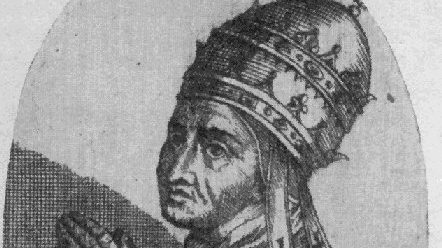Nicholas Boccasini was born in Treviso, Italy, in 1240. When he was 14, he entered the Dominican Order, and after 14 years of study, he became a lector of theology, an office he filled for several years.
In 1296, Nicholas was elected Master General of the Order. At this time, the general attitude towards Boniface VIII had become increasingly hostile, and the new general issued an ordinance forbidding his subjects to favor opponents of the reigning pope. He also urged them to defend the legitimacy of Boniface’s papacy in their sermon.
Nicholas’ loyalty remained unshakable, and Boniface bestowed confidence and many favors upon him. With two cardinal-legates, Nicholas formed an important embassy to conclude the armistice between Edward I of England and Philip IV of France, who were then at war.
In 1298, Nicholas was made a cardinal, and was afterwards appointed as bishop of Ostia and Dean of the Sacred College. He was sent to Hungary by the Holy See to work for the restoration of peace. When he returned to Rome, Boniface’s feud with Philip the Fair had reached its height.
In 1303, the enemies of the pope had made themselves masters of the sacred palace, of all the cardinals and prelates, only Nicholas and the bishop of Sabina remained at Boniface’s side to defend him.
A month after a violent attack from William of Nogaret and Sciarra Colonna, Boniface died. Nicholas was unanimously elected pope on October 22, taking the name Benedict XI. As pope, he restored peace with the French court. Benedict was pope for only one year, dying in Perugia on July 4, 1304.
Benedict was beatified in the year 1773. He is the author of a volume of sermons and commentaries on a segment of the Gospel of St. Matthew, on the Psalms, the Book of Job, and the Apocalypse.

